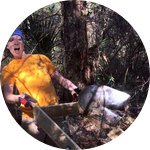About This Project
Archaeologists and historians of slavery know that the foodways of slaves -- their diet, dishes, and social mores of eating -- changed over time for a variety of reasons. Was emancipation one such reason? Did it further change the way people ate in the South? I am studying the foodways of enslaved and recently emancipated people in order to find out.
Ask the Scientists
Join The DiscussionWhat is the context of this research?
Archaeologists and historians of slavery know that what people ate changed over time for a variety of reasons (Orser 1998, Singleton 1995). Although recipes and cooking know-how are sometimes passed down, the descendants of enslaved people do not eat exactly the same things as their ancestors. (People in the 19th century did not have electricity or Publix.)
We know that plantation owners provided their slaves with rations; but, we also know that Lowcountry slaves grew some of their own food, gathered nuts and berries, fished, and hunted or trapped wild animals (Zierden and Reitz 2016). We do not know how much the loss of rations associated with freedom might have affected their diet. I want to find out how, and how much, their diet changed as a result of freedom.
What is the significance of this project?
This project will be the first of its kind, a comparison of pre- and post-emancipation foodways on a single South Carolina plantation. It will help historians make broader statements about how and why people's eating changes over time. How people procure, prepare, and dispose of food changes as does their ways of thinking about their foods and food-related activities.
The results of the project will help researchers to understand how Lowcountry cuisine (think shrimp and grits and hoppin' John) came to be the way we know it today. This information will inform us about the daily activities of people who lived through it emancipation, how it effected their daily lives, and how that impacts what we do today.
What are the goals of the project?
This fall I will use archaeology to explore a post-emancipation, tenant settlement site. I will dig shovel tests (small holes) and a few units (big, square holes) to recover the trash left behind by people who used to live there -- animal bones and pieces of broken ceramics. Everything about the work will be documented (soil types and depths, what objects are found and where exactly they were found, etc.). I will then compare the artifacts I find to the artifacts that I already have from the slave settlement site to see if and how the types and numbers of artifacts differ.
Example: If the bone types are different, I will know the slaves and tenants ate different meats.
Budget
One of the grants I was planning to apply for is not being offered this year. I am hoping to raise that money here instead so that I can still work!
These budget items are essential for project completion. While I will be using quite a bit of my own equipment and borrowing some from colleagues, there are a few items I need to purchase (square shovels, a second screen, tarps, line levels, and string).
I will be taking my personal vehicle, but need gas to get it to the Lowcountry (about 2 hours east of Columbia) and back. Mileage is estimated at $.54/mi. as per University of South Carolina rate standards. The trip is approximately 118 miles.
Finally, I will be taking someone to help me excavate (for company, but foremost for safety!) and we will need somewhere to stay near the site while we are completing the fieldwork (an airbnb or similar, estimated at about $90 for two people per night for 26 nights).
Endorsed by
 Project Timeline
Project Timeline
I will finish digging on September 28, 2018 and will finish artifact analysis by January 1, 2019.
Feb 21, 2018
Project Launched
Sep 03, 2018
Travel to the Lowcountry
Sep 28, 2018
Return to the University of South Carolina
Jan 01, 2019
Complete Artifact Analysis
Apr 30, 2019
Report Results (probably as a conference paper)
Meet the Team
Affiliates
Brandy Joy
Archaeologists do not dig dinosaurs. We dig up old trash.
I'm proud to dig trash out of dirt. It tells us a lot about how people lived in the past. I'm passionate about archaeology because history is interesting and being outside is fun. I also like looking at all the things we find and trying to make sense of how they came to be where I found them.
Additional Information
In addition to archaeology, the final project I do will incorporate historical documents (archives, books, and such) and oral histories of enslaved people and their descendants to understand what and how they ate through multiple avenues of research.
Project Backers
- 50Backers
- 119%Funded
- $3,332Total Donations
- $66.64Average Donation

